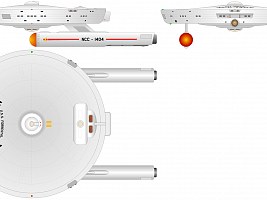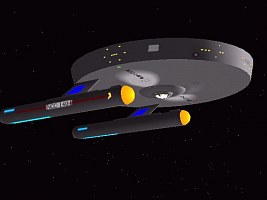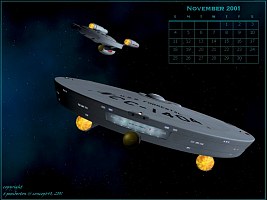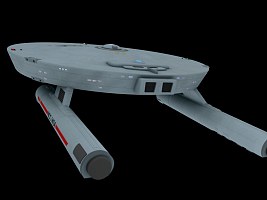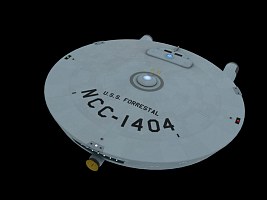Detroit Class
Although the original design of the Asia class included a number of significant innovations and subsequently served as a testbed for even more new technologies such as the precursors of photon torpedoes, only nine ships of the class were produced altogether. Starfleet Command deemed the design too expensive and its offensive capabilities inferior to other cruiser-type vessels of the time. Almost 20 years later, in some sort of a belated defiant reaction to this defeat, Starfleet Engineering proposed the Detroit class as a more compact and still somewhat larger offshoot of the Asia class with improved propulsion and weapons systems. Starfleet Command approved of the construction of two prototypes.
The warp pylons of the Detroit class were directly attached to the bottom of the bulky saucer section, overall simplifying the design. Many components of the new ships were still compatible to the Asia class and the Eclipse class though. The warp drive of the latter class was adopted without major changes, and its performance could be slightly improved. The top speed remained the same despite the increased mass of the Detroit class. Besides research, the main tasks of the Detroit class were transport of personnel, rescue missions and military missions. Its armament was superior to all previous starship types. For instance, the Detroit class was the first class equipped with photon torpedoes as standard weapons. Two large shuttlebays were located on either side of the center impulse drive, another one in the bow of the saucer.
Four more ships of the class were constructed immediately after the successful test of the two prototypes. Although all six ships performed well, the design was deemed obsolete owing to the availability of new materials and a better understanding of warp field efficiency. In the 2260s the ships' engineering staffs as well as shipyard engineers unanimously called for a refit. But the reconstruction of the Detroit class was not regarded worthwhile, because three of the ships showed irreparable structural weaknesses in the form of a multitude of microfractures after 40 years of heavy duty. These three ships were withdrawn from service until 2266, the three other ones until 2275.
Gallery
Datasheet
| Class specifications Ship type: Light cruiser Length: 184m Width: 138m Height: 43m Crew complement: 277 Max. speed: Warp 5.4 First commissioned in 2223 |
Commissioned ships USS Detroit NCC-1396 USS Columbia NCC-1401 USS Lion NCC-1402 USS Maine NCC-1403 USS Forrestal NCC-1404 USS Mexico NCC-1405 |
Credits
Thanks to Thomas Pemberton and Jay Hagen for their 3D models.






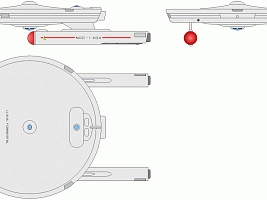
 Preliminary three-view schematics
Preliminary three-view schematics